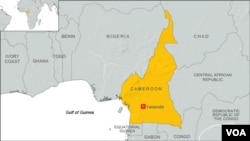As some 50 Cameroonian women recover in a trauma center from their ordeals of forced labor in Middle East homes, calls are resounding for the central African nation’s government to investigate and prosecute the human traffickers allegedly responsible for their plight.
The women, recuperating at a center in southwest Cameroon, told a VOA reporter disturbing stories of how they and their families were misled and the women mistreated.
Some of the women said they were deceived by television ads claiming there was work in Kuwait for domestic help, nurses and airport employees.
With Cameroon experiencing a 30 percent unemployment rate and a 60 percent underemployment rate, according to the country’s Institute of Statistics, many have left to seek jobs in Arab states.
Claudette Amikeh, 27, said she was treated like a slave during a year in Kuwait. She complained of little time to sleep and, "at times, no food, [only] stress."
Amikeh said she begged to be returned to Cameroon, but "this woman said I am going nowhere: I have come to work, I must work. I went down on my knees…. I cried to God for help. I prayed and cried."
This reporter, after failing to get an interview with the middle men who facilitate overseas employment failed, pretended to have a sister who wanted to travel.
"We have Kuwait for women at 250,000 ($500). You just need 250,000 ($500) and we help you to get your visa and everything," agent Ngala Timothy said in describing the process. “So what you need to give us is your passport and you give us photos and HIV tests and physical fitness certificates. You don't go there and then start looking for jobs. We give them an employment letter from Cameroon and as you get there you start working immediately."
Beatrice Titanji, who runs the trauma center, said these human traffickers also collect an advance salary of $3,000 from Middle East people who contract for the women’s services. They don’t give the money to the women.
Titanji said her organization expects the government to follow up with the perpetrators "and have them punished, because what they are doing is [enforcing] slavery in the 21st century.
"Our girls, our boys, our women, our children are actually suffering," Titanji continued. "You will not be surprised to find elderly women who have retired but who think they could do better there as house" helpers.










